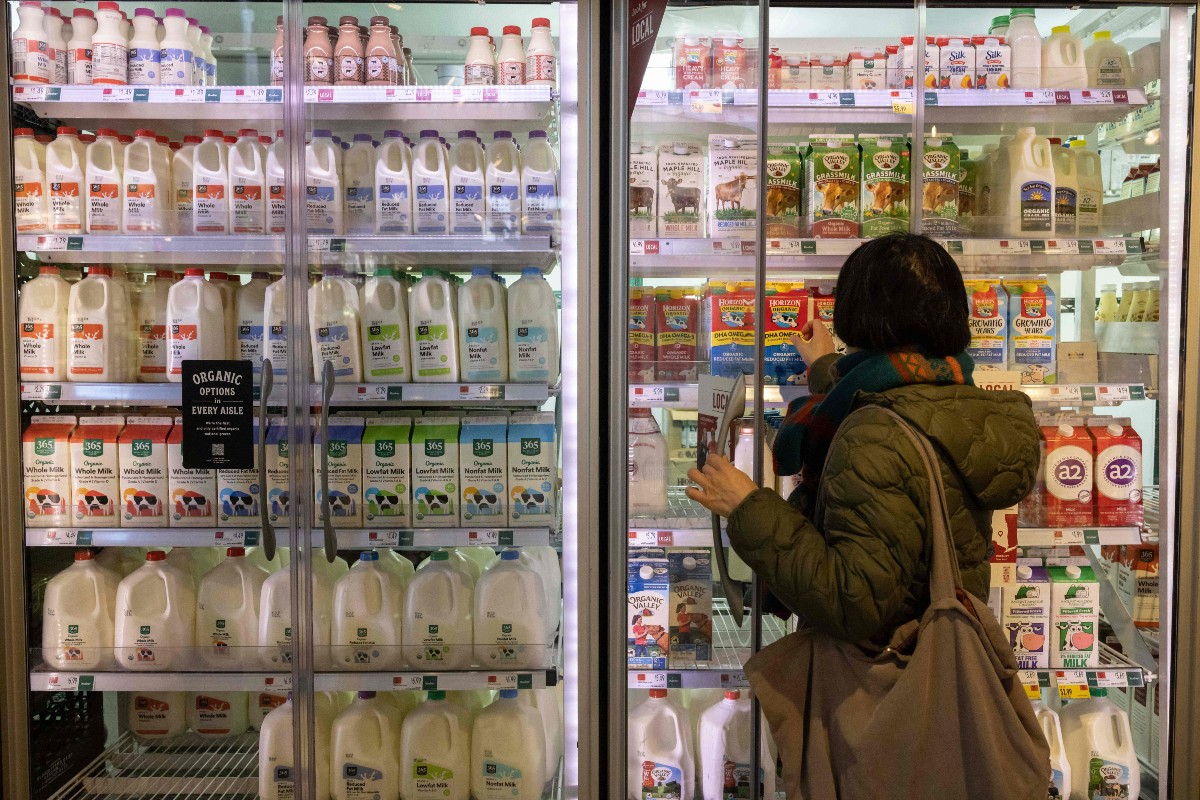(Trends Wide Spanish) — 2022 was the year of inflation in the United States, or rather, the worst inflation the country has seen in 40 years. The high levels that were maintained for a good part of the year, with a slight decrease in November, impacted andn the pocket of Americans with the widespread and sustained rises in the prices of gasoline, food and rent, among other goods and services.
The peak was recorded in June when inflation had a 9.1% increase in consumer prices, a new all-time high not seen since 1981, according to data published by the US Bureau of Labor Statistics.
At the time, Americans’ perceptions of the economy were deeply negative: 82% of the population said the country’s economic conditions were poor, according to a Trends Wide poll published days after the historic rise was reported.
As some economists warned of an impending recession, President Joe Biden tried to quell fears of “persistent” inflation, arguing that price increases were temporary.
The rise is directly related to the effects of the war in Ukraine (including sanctions against Russia) causing strong demand, disruptions in supply chains and higher gasoline prices.
Against this background, the Federal Reserve launched a series of aggressive increases in interest rates, which included seven consecutive hikes, to try to put an end to the inflationary crisis once and for all. Inflation is still high but fell more than expected in November and was the lowest since December 2021.
How much did prices rise and what does the decline reported in the last months of 2022 imply?
From gasoline to chicken: the year when everything cost more and more
In early 2022, the invasion of Ukraine by Russia, the largest exporter of oil and gas to world markets, helped catapult gasoline prices in the United States, which in June peaked at $5 a gallon for the first time. time in history, according to the American Automobile Association (AAA).
This increase did more than overwhelm drivers who needed to fill their car pumps by, as is often the case, making the prices of a wide range of goods and services, including food, more expensive.
As of mid-2022, grocery prices increased 12.2% in the 12 months ending in June. In that period, almost all items became more expensive: eggs rose 33.1%, flour 19.2% and chicken 18.6%. Milk became more expensive by 16.4% and fruits and vegetables by 8.1%.
But not only food was more expensive, for example, the rise in rental prices in the United States also gave signs of an inflationary crisis. In June, the national median rent hit a new record of $1,876 a month, up 14% from 2021, according to the Realtor.com rental report.
Has inflation peaked in the US?
Although it’s too early to declare victory over inflation in the United States, notes Trends Wide’s Christine Romans, from gasoline to chicken to televisions, there are increasing signs that inflation’s grip on American pockets may be loosening. .
Inflation was 7.1% annually in November, according to the Consumer Price Index. This rate, which came in below economists’ expectations of 7.3%, was the lowest since December 2021.
“I think we’re finally getting some indication of relief on the inflation front,” Ryan Sweet, chief US economist at Oxford Economics, told Trends Wide.
“[La moderación] is key for the Fed to release its foot from the brake. They are not going to take the brake off completely, they are still going to tighten monetary policy, but we are moving in the right direction,” he added.
The slowdown in inflation is reflected in the drop in gasoline prices, which in early December returned to last year’s levels. For perspective, a gallon of regular gas is down almost 50 cents in just one month, making it about $10 cheaper to fill up an average SUV today than it was a month ago.
Since then, gasoline has fallen sharply, as the economic slowdown and concerns about a global recession have helped reduce demand for oil around the world.
According to energy analysts, the release by the Biden administration of unprecedented amounts of emergency oil from the Strategic Petroleum Reserve earlier in the year has also contributed to the price collapse.
Sky-high rents and car prices continue to rise, but more slowly. After hitting a record high this summer, chicken prices have fallen sharply. And, according to real estate site RealPage, apartment rents have fallen for three straight months.
Christine Romans, Julia Horowitz, Xavier Serbiá, Betsy Klein, Jennifer Agiesta, Paul R. La Monica, Nicole Goodkind, Alicia Wallace, Matt Egan, Danielle Wiener-Bronner contributed to this report
(Trends Wide Spanish) — 2022 was the year of inflation in the United States, or rather, the worst inflation the country has seen in 40 years. The high levels that were maintained for a good part of the year, with a slight decrease in November, impacted andn the pocket of Americans with the widespread and sustained rises in the prices of gasoline, food and rent, among other goods and services.
The peak was recorded in June when inflation had a 9.1% increase in consumer prices, a new all-time high not seen since 1981, according to data published by the US Bureau of Labor Statistics.
At the time, Americans’ perceptions of the economy were deeply negative: 82% of the population said the country’s economic conditions were poor, according to a Trends Wide poll published days after the historic rise was reported.
As some economists warned of an impending recession, President Joe Biden tried to quell fears of “persistent” inflation, arguing that price increases were temporary.
The rise is directly related to the effects of the war in Ukraine (including sanctions against Russia) causing strong demand, disruptions in supply chains and higher gasoline prices.
Against this background, the Federal Reserve launched a series of aggressive increases in interest rates, which included seven consecutive hikes, to try to put an end to the inflationary crisis once and for all. Inflation is still high but fell more than expected in November and was the lowest since December 2021.
How much did prices rise and what does the decline reported in the last months of 2022 imply?
From gasoline to chicken: the year when everything cost more and more
In early 2022, the invasion of Ukraine by Russia, the largest exporter of oil and gas to world markets, helped catapult gasoline prices in the United States, which in June peaked at $5 a gallon for the first time. time in history, according to the American Automobile Association (AAA).
This increase did more than overwhelm drivers who needed to fill their car pumps by, as is often the case, making the prices of a wide range of goods and services, including food, more expensive.
As of mid-2022, grocery prices increased 12.2% in the 12 months ending in June. In that period, almost all items became more expensive: eggs rose 33.1%, flour 19.2% and chicken 18.6%. Milk became more expensive by 16.4% and fruits and vegetables by 8.1%.
But not only food was more expensive, for example, the rise in rental prices in the United States also gave signs of an inflationary crisis. In June, the national median rent hit a new record of $1,876 a month, up 14% from 2021, according to the Realtor.com rental report.
Has inflation peaked in the US?
Although it’s too early to declare victory over inflation in the United States, notes Trends Wide’s Christine Romans, from gasoline to chicken to televisions, there are increasing signs that inflation’s grip on American pockets may be loosening. .
Inflation was 7.1% annually in November, according to the Consumer Price Index. This rate, which came in below economists’ expectations of 7.3%, was the lowest since December 2021.
“I think we’re finally getting some indication of relief on the inflation front,” Ryan Sweet, chief US economist at Oxford Economics, told Trends Wide.
“[La moderación] is key for the Fed to release its foot from the brake. They are not going to take the brake off completely, they are still going to tighten monetary policy, but we are moving in the right direction,” he added.
The slowdown in inflation is reflected in the drop in gasoline prices, which in early December returned to last year’s levels. For perspective, a gallon of regular gas is down almost 50 cents in just one month, making it about $10 cheaper to fill up an average SUV today than it was a month ago.
Since then, gasoline has fallen sharply, as the economic slowdown and concerns about a global recession have helped reduce demand for oil around the world.
According to energy analysts, the release by the Biden administration of unprecedented amounts of emergency oil from the Strategic Petroleum Reserve earlier in the year has also contributed to the price collapse.
Sky-high rents and car prices continue to rise, but more slowly. After hitting a record high this summer, chicken prices have fallen sharply. And, according to real estate site RealPage, apartment rents have fallen for three straight months.
Christine Romans, Julia Horowitz, Xavier Serbiá, Betsy Klein, Jennifer Agiesta, Paul R. La Monica, Nicole Goodkind, Alicia Wallace, Matt Egan, Danielle Wiener-Bronner contributed to this report


:max_bytes(150000):strip_icc():focal(770x458:772x460)/William-Sadler-and-wife-Marni-Joan-Bakst-122024-ebcfa977f3e345dca1e0bcf984de6ada.jpg)


